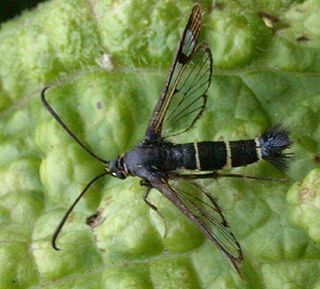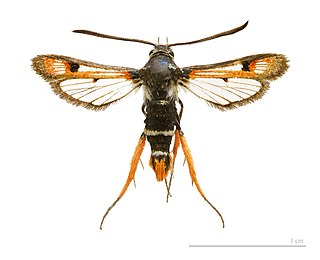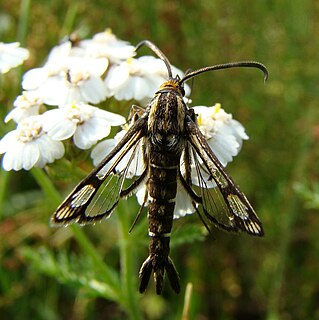Related Research Articles

The Sesiidae or clearwing moths are a diurnal moth family in the order Lepidoptera known for their Batesian mimicry in both appearance and behaviour of various Hymenoptera.

Sesioidea is the superfamily currently containing clearwing moths (Sesiidae), castniid moths (Castniidae) and little bear moths (Brachodidae). There is evidence from head and thoracic morphology that the first two families, internally feeding in plants as caterpillars, are sisters, whilst some brachodids are known to feed on leaf surfaces. Sesioidea are considered to be the sister group of Cossoidea which contain the also internal-feeding Goat and Leopard moths.

The hornet moth or hornet clearwing is a large moth native to Europe and the Middle East and has been introduced to North America. Its protective coloration is an example of Batesian mimicry, as its similarity to a hornet makes it unappealing to predators. The hornet moth has been linked to the large dieback of poplar trees across Europe because its larvae bore into the trunk of the tree before re-emerging as adults.

Synanthedon culiciformis, known as the large red-belted clearwing, is a moth of the family Sesiidae. It is found in the Palearctic and Nearctic realms.

Synanthedon tipuliformis, known as the currant clearwing, is a moth of the family Sesiidae. It is endemic to the Palearctic realm, but is an invasive species in the Nearctic realm and the Australasian realm.

Synanthedon vespiformis, the yellow-legged clearwing, is a moth of the family Sesiidae. It is found in the Palearctic realm.

Bembecia ichneumoniformis, the six-belted clearwing, is a moth of the family Sesiidae.
Camaegeria is a genus of moths in the family Sesiidae. The genus was erected by Embrik Strand in 1914.

Synanthedon andrenaeformis, the orange-tailed clearwing, is a moth of the family Sesiidae. It is known from most of Europe. It is also present in the Near East.
Conopsia bicolor is a moth of the family Sesiidae. It is known from Benin.
Microsphecia brosiformis is a moth of the family Sesiidae. It is found from the Balkan Peninsula to the Crimea, southern Russia (Sarepta), Asia Minor, the Caucasus, Iran, Turkmenistan and Afghanistan.

Synanthedon stomoxiformis is a moth of the family Sesiidae. It is found in most of Europe and the Middle East.

Bembecia scopigera, the six-belted clearwing or glearwing, is a moth of the family Sesiidae. It is found from central Spain over most of south-western and central Europe, the Balkans, Greece, southern Russia and Ukraine to Turkey.

Pyropteron triannuliformis is a moth of the family Sesiidae. It is found from most of Europe to the Near East and Central Asia.

Chamaesphecia annellata is a moth of the family Sesiidae. It is found from Germany and Poland south to Greece and Turkey and east to southern Russia and the Caucasus.
Chamaesphecia dumonti is a moth of the family Sesiidae. It is found from France to southern Russia and the Caucasus and from Germany south to Italy and the Balkan Peninsula., It is also found in western Turkey.
Chamaesphecia nigrifrons is a moth of the family Sesiidae. It is found in central and south-eastern France, Corsica, Luxembourg, South Belgium, south-western Germany, Austria, south-eastern Czech Republic, eastern Slovakia, Hungary, Croatia, Slovenia, former Yugoslavia, Serbia, southern Republic of Macedonia, Bosnia and Herzegovina, Bulgaria, northern Romania, northern Greece, southern Ukraine, Transcaucasia, north-western and southern Turkey and north-western Syria.
Pyropteron leucomelaena is a moth of the family Sesiidae. It is found in France, Spain, Portugal, Italy, the Balkan Peninsula and Ukraine. It is also found in North Africa and from Asia Minor to Armenia.

Synanthedon cephiformis is a moth of the family Sesiidae. It is found in Central Europe and Eastern Europe.

Synanthedon scoliaeformis, the Welsh clearwing, is a moth of the family Sesiidae. It is found from almost all of Europe, east through Russia to Japan.
References
- ↑ Checklist of the Sesiidae of the World Archived March 26, 2012, at the Wayback Machine
| This article relating to moth family Sesiidae is a stub. You can help Wikipedia by expanding it. |